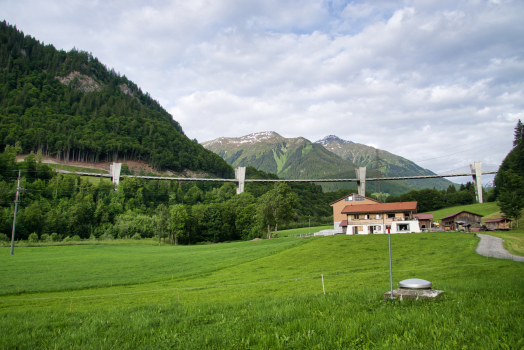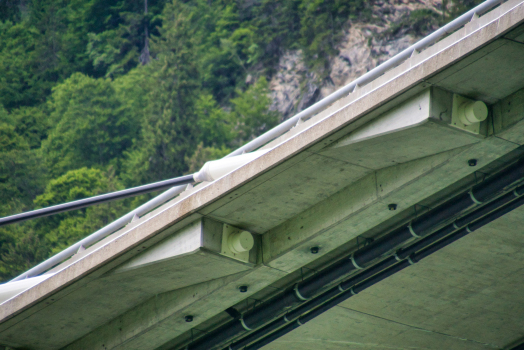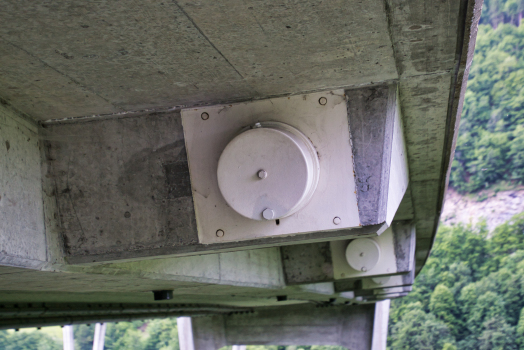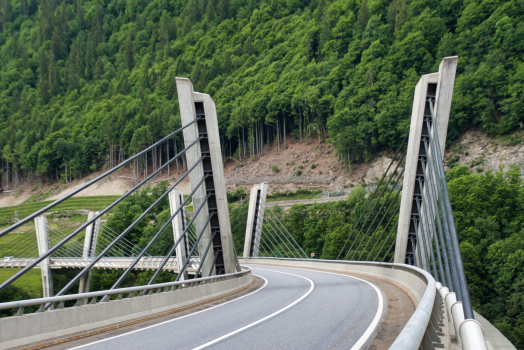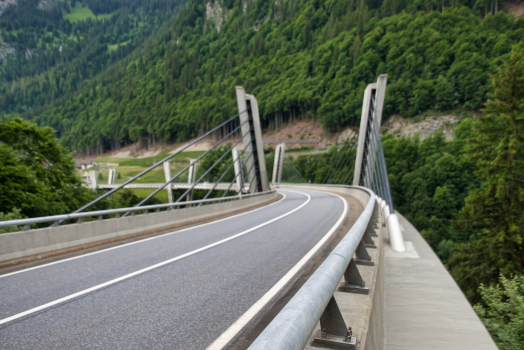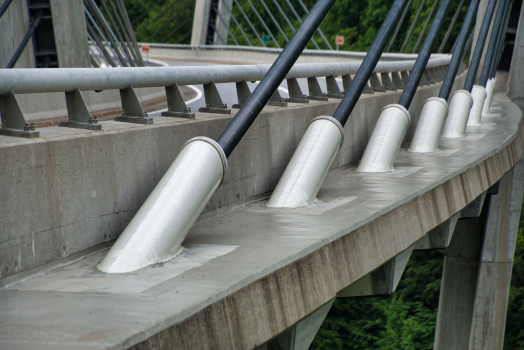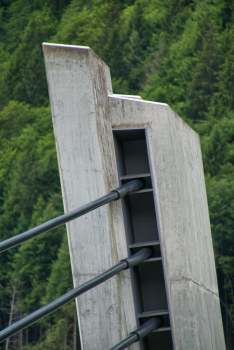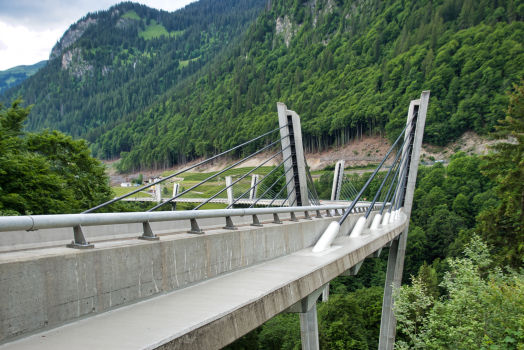General Information
| Name in local language: | Sunnibergbrücke |
|---|---|
| Beginning of works: | Spring 1996 |
| Completion: | Fall 1998 |
| Status: | in use |
Project Type
| Structure: |
Multi-span extradosed bridge |
|---|---|
| Function / usage: |
Road bridge |
| Material: |
Prestressed concrete bridge |
| Support conditions: |
for registered users |
| Construction method: |
Balanced cantilever method |
| Plan view: |
Structurae Plus/Pro - Subscribe Now! |
| Material: |
Structurae Plus/Pro - Subscribe Now! Structurae Plus/Pro - Subscribe Now! |
| Secondary structure(s): |
Structurae Plus/Pro - Subscribe Now! Structurae Plus/Pro - Subscribe Now! |
Awards and Distinctions
| 2001 |
for registered users |
|---|
Location
| Location: |
Klosters-Serneus, Grisons, Switzerland |
|---|---|
| Coordinates: | 46° 53' 9" N 9° 51' 23" E |
Technical Information
Dimensions
| total length | 526.00 m | |
| longest span | 140.00 m | |
| span lengths | 59.00 m - 128.00 m - 140.00 m - 134.00 m - 65.00 m | |
| number of spans | 5 | |
| horizontal radius of curvature | 503.00 m | |
| bridge surface | 6 510 m² | |
| height above valley floor or water | 50 - 60 m | |
| deck | deck width | 12.378 m |
| pylons | pylon height | max. 77 m |
| dimensions at base | 8.80 m x 4.25 m |
Quantities
| structural steel | 240 t | |
| concrete volume | 8 500 m³ | |
| prestressing steel | 50 t | |
| reinforcing steel | 1 250 t |
Cost
| cost of construction | Swiss Franc 17 000 000 |
Materials
| cables |
steel
|
|---|---|
| deck |
prestressed concrete
|
| piers |
reinforced concrete
|
| pylons |
reinforced concrete
|
| abutments |
reinforced concrete
|
Excerpt from Wikipedia
The Sunniberg Bridge is a curved multi-span extradosed road bridge with low outward-flaring pylons above the roadway edges, designed by Christian Menn and completed 1998. It carries the Klosters bypass road 28 across the Landquart River near the village of Klosters in the canton of Grisons in eastern Switzerland. It is notable because of its innovative design and aesthetically pleasing appearance sensitive to its surroundings.
Design
The bridge was designed by Christian Menn (conceptual design) together with Dialma Jakob Baenziger (final design) as a challenge of integrating the structural form of a curved multi-span extradosed bridge into the larger rural Alpine landscape, given the prominent location of the bridge in the Landquart valley, "but with a certain elegance".
The Klosters bypass highway crosses the Landquart River valley on a 526 m (1,726 ft) long curving road bridge (horizontal radius of curvature about 500m) at a height of between 50 and 60m above the valley floor. Four slender H-shape piers rise up from the valley floor (8.80m × 4.25m at the base), like the tall trees nearby. Proceeding upwards, the arms of the tall piers/pylons flare out to subtend and sustain the 12.4 m (41 ft) wide curved and banked deck, nestling the roadway in their arms.
The bridge received the Outstanding Structure Award in 2001 for being "a delicate expression of structural art responding to a sensitive landscape.".
Construction
Construction started Spring 1996, by Batigroup AG and Vetsch AG, starting at the north end with pier P1, the pier closest to the Landquart to Klosters road. Once the piers were completed, the deck were erected using the balanced cantilever method. The bridge was completed ahead of schedule in Fall 1998.
The completed bridge was not opened for traffic because the Gotschna Tunnel, to which the south end of the bridge was connected, was still under construction. Instead, it was used only to access the excavation sites for the tunnel in the interim, until 2005 when the Klosters bypass, including both the bridge and the tunnel, was opened for traffic in a ceremony with Prince Charles, a frequent visitor to Klosters.
Critique
In the 2009 International Award of Merit to engineer/designer Christian Menn, his Sunniberg Bridge, along with his Ganter Bridge, his Leonard P. Zakim Bunker Hill Memorial Bridge as well as others, were singled out as being renown "worldwide for their structural beauty, economic efficiency, technical innovation, and for simply being structural engineering oeuvres of art."
From a 2015 Structural Engineering International retrospective, "The Impact of the Sunniberg Bridge on Structural Engineering, Switzerland", the following points can be made about the impact of the Sunniberg Bridge:
- It was a favorite among structural engineers, ranked no. 5 among most favorite structure published from 1991 to 2000.
- It helped establish "extradosed bridge" as a new and distinct bridge type.
- It is a curved multi-span extradosed road bridge, which is uncommon.
- It is an integral bridge, i.e., it has neither joints nor bearings at their ends, but the girder is rigidly connected to the abutments; thus it is easier to maintain.
- It shows that concrete can be used to build slender structures with elegance.
The Sunniberg Bridge has become an icon of Swiss engineering, standing for high performance, quality and elegance, perception of structural engineering, an object inspiring admiration...
Text imported from Wikipedia article "Sunniberg Bridge" and modified on October 9, 2020 according to the CC-BY-SA 4.0 International license.
Participants
- Christian Menn (designer)
- Andrea Deplazes (architect)
Relevant Web Sites
Relevant Publications
- (2002): 30 Bridges. Laurence King, pp. 126-129.
- : 30 Brücken. Callwey Verlag, Munich (Germany), pp. 126-129.
- (1998): Aspekte der örtlichen Bauleitung: Sunnibergbrücke: Organisation im Rahmen des Gesamtprojekts. In: Schweizer Ingenieur und Architekt, v. 116, n. 44 (29 October 1998).
- (1998): Baukultur im Brückenbau. In: Baukultur, n. 3 ( 1998), pp. 25-29.
- (1998): Baustelleninstallation und Bauvorgang: Sunnibergbrücke: Optimierungsaufgabe für die Unternehmung. In: Schweizer Ingenieur und Architekt, v. 116, n. 44 (29 October 1998).
- About this
data sheet - Structure-ID
20000072 - Published on:
28/10/1998 - Last updated on:
22/06/2024

